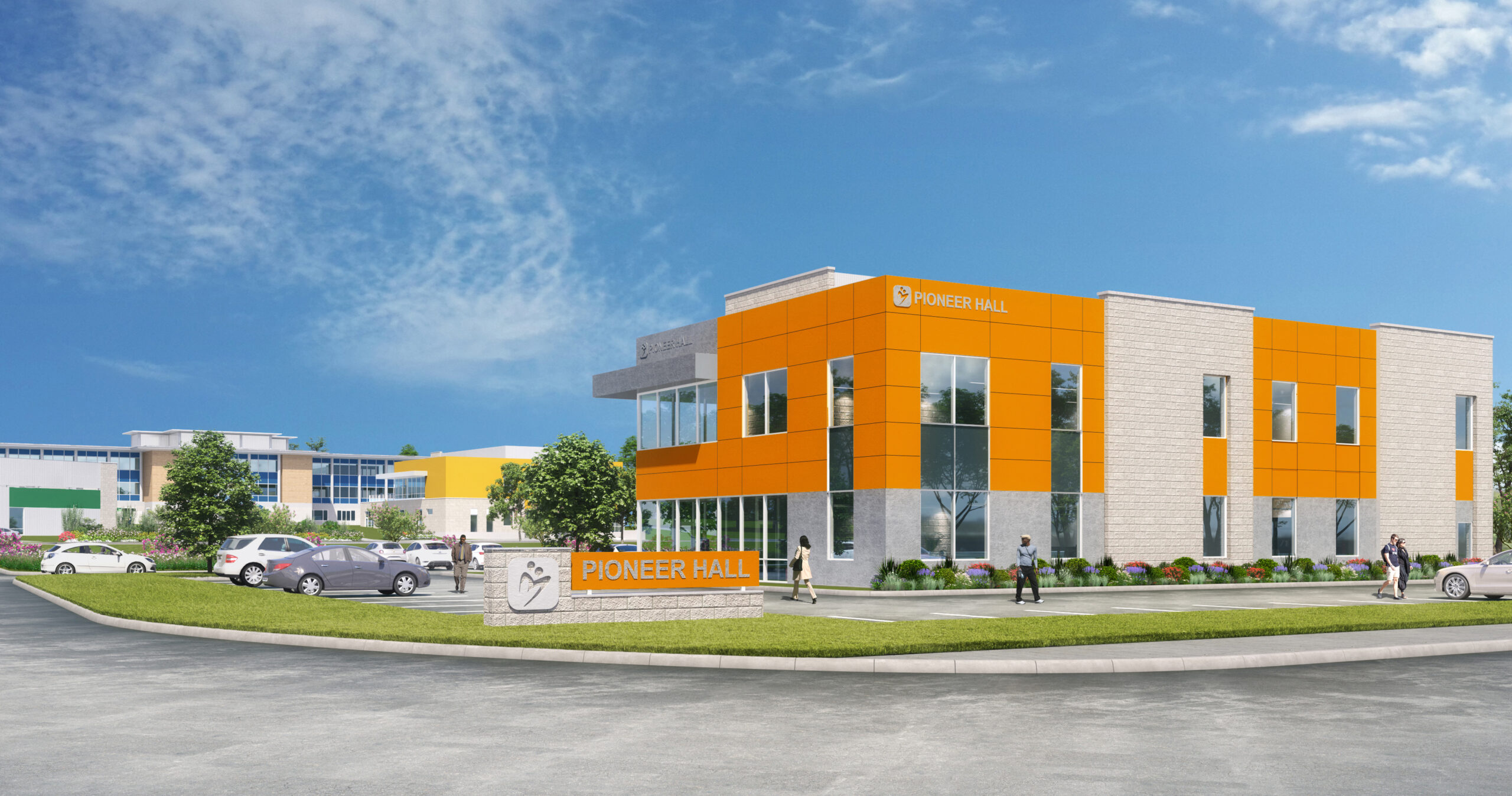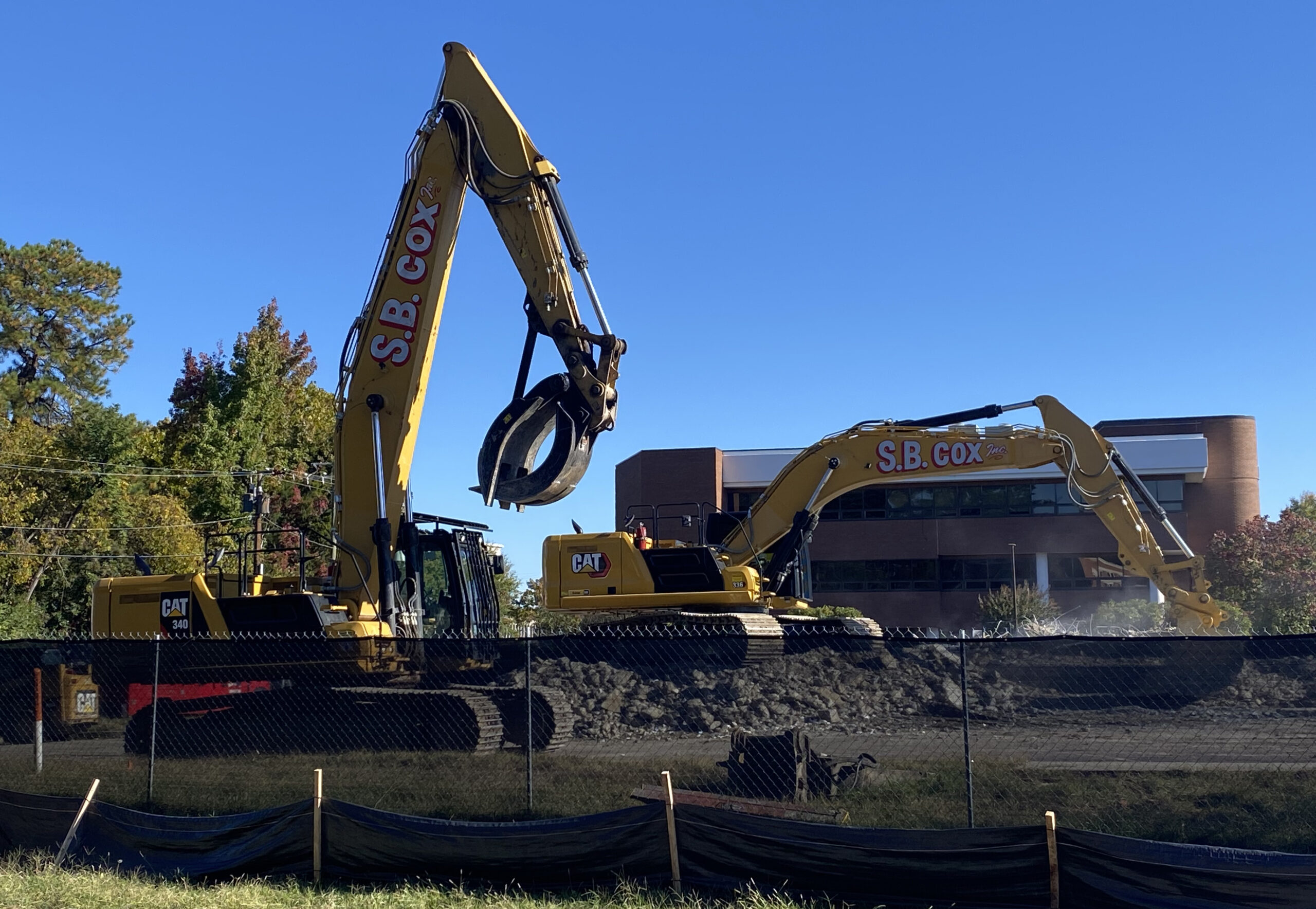
The upcoming Pioneer Hall at the Faison Center’s Henrico campus is planned to be a 12,000-square-foot building that would be home to the nonprofit’s adult day services program and employment academy. (Image courtesy of the Faison Center)
The Faison Center is underway on a new building across from Willow Lawn shopping center, a project that will polish off $24 million worth of improvements to its campus.
The autism nonprofit began demolition work last week to pave the way for a from-scratch 12,000-square-foot, two-story building set to rise at 1600 Willow Lawn Drive.
Dubbed Pioneer Hall, the building will be used for Faison’s adult day services program and employment academy.
The day services program provides volunteer and social opportunities for autistic adults, while the academy provides teenagers and young adults life skills to help them navigate the world more independently as they age.
“The community-based programming is for adults with more support needs and the employment program is a program intended for students to increase their life skills. It’s really about working on independent skills and getting as independent as possible,” President and CEO Brian McCann said.
Those programs are currently housed in leased space at 1506 Willow Lawn Drive, which the nonprofit plans to vacate.
The land for Pioneer Hall is owned by the Faison Center and had been occupied by a 5,000-square-foot office building that had once been a bank. McCann said the building had been used by the nonprofit for various things over the years but was deemed too small for further use.
Hourigan is the general contractor. Baskervill is the architecture firm on the project.
Pioneer Hall is expected to open in late spring or early summer 2023. It will also be the site of the nonprofit’s behavioral health clinic.
McCann estimated that about 40 people use the center’s adult-oriented programming, which includes residents in an on-campus, semi-independent apartment complex called the Faison Residence. He said that the new hall facility could help the program grow to around 60 people in its first couple years of operation.

Demolition on an existing building at 1600 Willow Lawn Drive started last week to make way for the last new building, Pioneer Hall, to be constructed. (Jack Jacobs photo)
McCann said there’s plenty of demand for services for autistic adults but that it’s difficult to provide or expand the programming due to what he considered restrictive state regulations and challenges in hiring staff.
“The need is tremendous for adult autism services,” he said.
McCann declined to comment on the cost of Pioneer Hall’s construction specifically. But he said the project and other recent capital projects total $24 million, which is being raised by the Forward into the Future fundraising campaign.
The campaign kicked off in summer 2017 and is slated to wrap up in December.
Pioneer Hall is expected to be the last of four new buildings as part of the Faison Center’s 2017 master plan for new facilities. Though there were previously plans for a fifth building, McCann said that project is no longer on the table.
In May 2020, the Faison Center finished construction on Markel Hall at 5311 Markel Road, a 15,000-square-foot building that houses classroom space, administrative offices and other facilities.
In 2019, the nonprofit opened the doors to the 10,000-square-foot Flo and Tony Guzman Community Center. In 2018, it opened the three-story, 18,000-square-foot Kirshner-Mihaloff Hall, an addition to the nonprofit’s school for children with autism.
The Faison Center opened locally in 1999 as the Faison School. It also operates a school for people with autism in Newport News.
The nonprofit reported total revenue of $23.6 million and total expenses of $19 million in fiscal year 2020, according to its tax filings for that year, which is the latest available on ProPublica’s nonprofits database.

The upcoming Pioneer Hall at the Faison Center’s Henrico campus is planned to be a 12,000-square-foot building that would be home to the nonprofit’s adult day services program and employment academy. (Image courtesy of the Faison Center)
The Faison Center is underway on a new building across from Willow Lawn shopping center, a project that will polish off $24 million worth of improvements to its campus.
The autism nonprofit began demolition work last week to pave the way for a from-scratch 12,000-square-foot, two-story building set to rise at 1600 Willow Lawn Drive.
Dubbed Pioneer Hall, the building will be used for Faison’s adult day services program and employment academy.
The day services program provides volunteer and social opportunities for autistic adults, while the academy provides teenagers and young adults life skills to help them navigate the world more independently as they age.
“The community-based programming is for adults with more support needs and the employment program is a program intended for students to increase their life skills. It’s really about working on independent skills and getting as independent as possible,” President and CEO Brian McCann said.
Those programs are currently housed in leased space at 1506 Willow Lawn Drive, which the nonprofit plans to vacate.
The land for Pioneer Hall is owned by the Faison Center and had been occupied by a 5,000-square-foot office building that had once been a bank. McCann said the building had been used by the nonprofit for various things over the years but was deemed too small for further use.
Hourigan is the general contractor. Baskervill is the architecture firm on the project.
Pioneer Hall is expected to open in late spring or early summer 2023. It will also be the site of the nonprofit’s behavioral health clinic.
McCann estimated that about 40 people use the center’s adult-oriented programming, which includes residents in an on-campus, semi-independent apartment complex called the Faison Residence. He said that the new hall facility could help the program grow to around 60 people in its first couple years of operation.

Demolition on an existing building at 1600 Willow Lawn Drive started last week to make way for the last new building, Pioneer Hall, to be constructed. (Jack Jacobs photo)
McCann said there’s plenty of demand for services for autistic adults but that it’s difficult to provide or expand the programming due to what he considered restrictive state regulations and challenges in hiring staff.
“The need is tremendous for adult autism services,” he said.
McCann declined to comment on the cost of Pioneer Hall’s construction specifically. But he said the project and other recent capital projects total $24 million, which is being raised by the Forward into the Future fundraising campaign.
The campaign kicked off in summer 2017 and is slated to wrap up in December.
Pioneer Hall is expected to be the last of four new buildings as part of the Faison Center’s 2017 master plan for new facilities. Though there were previously plans for a fifth building, McCann said that project is no longer on the table.
In May 2020, the Faison Center finished construction on Markel Hall at 5311 Markel Road, a 15,000-square-foot building that houses classroom space, administrative offices and other facilities.
In 2019, the nonprofit opened the doors to the 10,000-square-foot Flo and Tony Guzman Community Center. In 2018, it opened the three-story, 18,000-square-foot Kirshner-Mihaloff Hall, an addition to the nonprofit’s school for children with autism.
The Faison Center opened locally in 1999 as the Faison School. It also operates a school for people with autism in Newport News.
The nonprofit reported total revenue of $23.6 million and total expenses of $19 million in fiscal year 2020, according to its tax filings for that year, which is the latest available on ProPublica’s nonprofits database.


